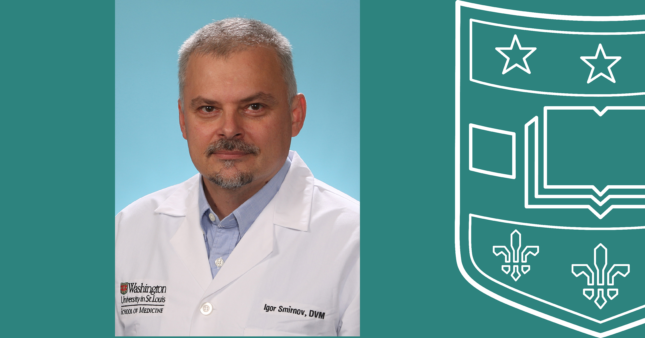For this Faculty Feature, we spoke with Igor Smirnov, D.V.M. His main interest is in developing animal models of traumatic and degenerative injuries of the nervous system to assess the role of the immune system during normal brain function, after an injury, and during the course of a neurodegenerative diseases.
Tell us about your background. Where did you grow up, and when did you first become interested in science and medicine?
I grew up in a small village near Moscow, Russia, I helped my family with farm animals, and the career chose was somewhat obvious – I decided to become a vet. I pursued my Doctor of Veterinary Medicine (D.V.M.) and MSc in Biochemistry at the Moscow State Academy of Veterinary Medicine. My interest in science and medicine began early in my academic career, specifically focusing on veterinary medicine, which later transitioned into a profound interest in small animal models for neuroimmunology research.
What is your career path?
My career path has been diverse and international. After graduating from the Veterinary Academy, I worked in a city vet clinic for a year before moving to Israel, where I worked in the foot-and-mouth disease research laboratory at the Veterinary University for a few years. Seeking new opportunities, I accepted a position as the Head of the Animal Facility at Proneuron Biotechnologies, a biotechnology company founded by the world-renowned neuroimmunologist Prof. Michal Schwartz. There, I performed animal experiments that preceded Phase I and II clinical trials for a new experimental treatment for patients with traumatic spinal cord injuries.
In 2007, I moved to the US and continued my journey in neuroimmunology at Syracuse University, working with Dr. Blair Calancie on spinal cord contusion and cauda equina injury models. Our research focused on studying the mechanisms of neuron survival and death after trauma.
In 2010, I applied for the position of Research Scientist in the Department of Neuroscience at the University of Virginia, joining Dr. Kipnis’ laboratory and promoted to Assistant Professor of Research. In Dr. Kipnis’ lab, I was involved in establishing several animal models utilizing intricate microsurgical and neurosurgical procedures.
Currently, I am working in Dr. Kipnis’ lab in the Department of Pathology and Immunology at WashU. I continue developing animal models of traumatic and degenerative injuries of the nervous system to study the role of the immune system during normal brain function, after injury, and during the course of neurodegenerative diseases.
What are your favorite parts of your current role?
My favorite parts of my current role include working with animals, mentoring new students, developing new techniques, and finding ways to improve human life through science. I particularly enjoy establishing comprehensive and reproducible animal models for studying immune responses in normal CNS function and during neurodegenerative diseases. This work is both challenging and immensely rewarding, as it pushes the boundaries of our understanding in these areas.
What is a memorable moment you’ve had while working in the department?
It is hard to single out any specific moment because there have been many, all related to the collaborative and supportive nature of everyone in the department. I am continually amazed by the quality of science here. Our department, home to many world-renowned scientists, thrives in a highly collaborative environment. The combined expertise and perspectives allow us to advance our research and move scientific discoveries forward at a remarkable pace.
What special skills or talents do you have that people may not know about?
I have some grilling skills that might surprise people. I’ve honed these skills over the years and can turn a simple BBQ into a memorable meal. While it may not be a skill that comes up often in professional conversations, it’s something I take pride in and enjoy sharing with friends and family.
What are some of your favorite hobbies or activities?
In my free time, I enjoy activities that allow me to unwind and relax. My favorite activities are gardening, camping, and fishing. I also enjoy reading particularly science fiction and historical novels.
What is your advice to aspiring people in your field?
My advice to anyone interested in neuroimmunology is to stay curious and keep pushing forward. It can be tough, but the rewards are huge. Take every chance to learn, find mentors to help you, and always hold onto your passion for science and discovery. Your work can make a significant difference in understanding and treating diseases.
